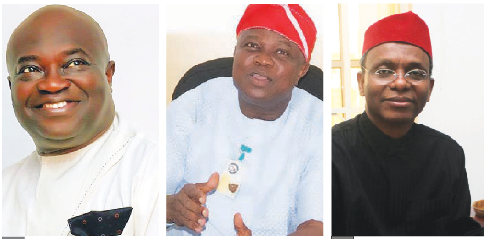Assistant Politics Editor, DANIEL KANU, peeps into the exploits of some states as their chief executives clock 100 days in office.
In March 1933, Franklin Roosevelt became the United States (U.S.) President and met the Great Depression that was thought to have been caused by former President Herbert Hoover. He had to save the Big Sam, hence he gave himself a target of 100 days.
Ever since, the fad has caught on. It has become a routine for Nigerians also to make periodic assessment of performance of government both at the federal and state levels. Even the local governments are not spared of this tradition.
Yesterday, September 5, was exactly 100 days since the inauguration of President Muhammadu Buhari and some state governors on May 29, 2015. Little wonder everywhere and at every turn, the mantra is 100 days in office.
So, evaluation of 100 days in office has become very vital, as it lays a foundation and points the way as to how the government would be run before the end of its tenure.
The first 100 days is always a subject of great interest, controversy and speculation.
But it has been observed from different cases that success in the first 100 days, however, is not a guarantee of success later nor have early difficulties necessarily condemned a government to failure.
The performance, either good or poor, is judged from the accomplishment of government blueprint at different sectors of development. The accomplishment of such given tasks are usually measured against specific known standards of accuracy, completeness, cost and speed.
Interestingly, the performance of a governor in our present democratic government seems to be measured by the improvement of the quality of life in the state in his/her tenure.
Good governance is not just about making right decisions, but also about the best possible process for implementing those decisions. It is also a subset of governance, wherein public resources and problems are managed effectively, efficiently and in response to critical needs of the state.
Although 100 days is not long a time, it provides an insight on how the chief executive is prepared for the task ahead. While some governors have embarked on silent revolution in their states, there are some that are yet to come to terms with the job reality but carried away with congratulatory and solidarity messages.
What TheNiche observed has been that in states where the ruling party, the All Progressives Congress (APC), won, it has been smooth change-over with little or no criticism, while states that had the opposition party in the saddle have witnessed greater critique.
Abia: Although the state may be said to still be in trenches, with Alex Otti, governorship candidate of the All Progressives Grand Alliance (APGA), still contesting the result of the election, Governor Victor Ikpeazu seems to be soldiering on with development of the state.
Ikpeazu has given residents of the state the indication that he was prepared for the task ahead, particularly on core infrastructure in Aba, the commercial capital. He has promised to administer good governance and to up what his predecessor, Theodore Orji, left behind in his legacy projects.
Three days after he was sworn-in as the fourth democratically-elected governor of the state, Ikpeazu, a renowned biochemist and former general manager, Abia State Environmental Protection Agency (ASEPA), flagged off the reconstruction of some crumbling roads in Aba, largely reputed as the commercial hub of the state.
The roads included the Umuola, Umuocham, Kamalu, Ukaegbu, Ehere, Umule, and Ukwu Mango roads among others.
“These roads are important for smooth vehicular movement within the commercial nerve centre of Abia State. The complete renovation of these seven roads would be achieved within my first 100 days in office,” Ikpeazu had promised.
While speaking at the Umuahia Township Stadium on May 29, 2015, shortly after he was sworn-in, the governor said since the state was endowed with both human and natural resources, his administration would vigorously exploit both to ensure rapid and even development of the state.
And true to his word, he seems to be on course, going by the opinion gathered from most Abians. He has assured Abians of delivering not less than 22 roads within 100 days.
He is repositioning the leather and garment clusters in Aba.
Ikpeazu promised that within the first 100 days in office, his administration would commence the provision of critical infrastructure that would fast-track the economic development of the state. So far, the verdict is that Ikpeazu is on track.
Lagos: Since he took over office from Babatunde Fashola, a Senior Advocate of Nigeria (SAN), most Lagosians believe Akinwunmi Ambode is yet to add value to Lagos State.
It may not be that he is not doing enough, but the perception is that he is yet to fit into the big shoe that Fashola left behind.
Commentators agree that Fashola truly raised the bar of governance during his tenure – despite on-going intrigues to rubbish him – and that it would take one with great vision, character and courage to match his achievement let alone beat the record.
“What we are witnessing is movement without motion,” Matthew Ademola told TheNiche.
Most Lagosians have started to complain that the Lagos State Traffic Management Authority (LASTMA) has gone to sleep resulting in the return of traffic jams.
But Tajudeen Olusi, member of the House of Representatives from Lagos State in the Second Republic, disagrees with the perception. Rather, he says there are obvious signs from what Ambode has so far done that the state would be better for it under his administration.
“Ambode and his team have shown that he is determined to serve Lagosians meritoriously irrespective of their ethnic, religious or political affiliations,” he noted.
But it may be wrong to think that Ambode will not restore hope in Lagos, given his intimidating credentials and training.
Already, contracts are being awarded on some roads.
Ambode is not taking the issue of transparency and accountability glibly. As the trend in modern governance demands, Ambode, it was gathered, has embraced openness and accountability.
TheNiche gathered that by the time he fully unfolds his blueprint, which will come with the appointment of his commissioners, Lagosians will have cause to smile.
Rivers: The state has been dogged by great controversy, allegations and counter-allegations since Governor Nyesom Wike took over. It has been serious battle with his predecessor, Chibuike Amechi. While Amaechi is saying that he left billions of naira in the state treasury, Wike is refuting it, saying he met an empty treasury. But in all, Wike has said he would not be distracted.
It was gathered that the governor has paid civil servants salaries arrears and allowances, cleared allowances of sportsmen and women, pensioners, as well as tuition fees of Rivers students on state scholarship abroad.
So, observers in the state say he is turning the state into a huge construction site with the mobilisation of two construction giants, Julius Berger and RCC, which are currently embarking on massive construction and rehabilitation of Port Harcourt roads, spanning through adjoining local government areas, and other internal roads in Diobu, Borikiri, Iwofe, GRA, Akpajo, Elioparanwo, Tombia extension, Eagle Island, Elelenwo, Trans-Amadi, Orazi, among others.
Going by reports, there seems to be tension in the state, as those loyal to Amaechi and sympathisers of the APC are still contesting the victory of Wike.
Kaduna: Former Federal Capital Territory (FCT) minister and now Governor of Kaduna State, Nasir el-Rufai, to most commentators, is walking the talk. Although he talks relatively so much, those following his leadership trend since he took the oath of office agree that he has hit the ground running with his cabinet.
El-Rufai believes in the philosophy of running a lean government, as he has streamlined ministries in the state from 19 to 13.
He has received pass mark from different sections of the state, ranging from 50 per cent cut from his salary, banning of beggars, the autonomy to local governments and control of Kaduna South crisis. He has embarked on construction of roads and other infrastructure. He has also been praised for beginning the massive reconstruction of his state for the benefit of the future generation.
Enugu: Governor Ifeanyi Ugwuanyi has used the opportunity of his inauguration address and other fora to articulate specific issues he tends to pursue with relentless resolve. But in the eyes of the public, not much is seen to have been done.
The governor has been taunted as being slow and indecisive.
But those close to the governor say he has been working assiduously to give his people the best.
Critics scuff that in his 100 days on seat, the governor has spent more days receiving solidarity visitors than facing the task ahead.
Reports from the state reveal that there are few on-going projects, as the governor is said to be looking before leaping.
This is because almost all the political heavyweights in the state, who initially had leverages from Aso Rock under President Goodluck Jonathan, are said to be on his neck for one favour or another.
Delta: The impression in many quarters is that the Governor Ifeanyi Okowa-led government has been that of commotion.
In Okowa’s first public outing after he was sworn in, he addressed members of the House of Assembly where he intimated bewildered lawmakers that his administration had inherited a debt profile of N637 billion, with a call on Deltans to be ready to make sacrifices necessary to put the state on the path of economic recovery.
Although Okowa has always reiterated that his administration has zero tolerance for disunity, sectionalism and corruption, critics say it has not been reflected in practical terms.
He has received serious condemnation for siting of some of his projects to favour Delta North, his senatorial district.
Delta State Oil Producing Areas Development Commission (DESOPADEC), which has been restructured under him, continues to receive virulent criticism. It is said to be plagued with undue political interference starting from its location.
Happily enough, some socially-relevant projects have been flagged off.
But in all, it has been a slow but steady action which most Deltans aver would benefit the state in the long run.
Imo: Governor Rochas Okorocha is doing his second tenure, but critical observers of his tenure contend that it is that of “the more you look, the less you see”. Okorocha, they claim, is a rabble-rouser, deep in propaganda rather than doing the real work.
The perception is that the governor has privatised state establishments using surrogates.
Although some communities have benefitted in some road projects, the cost of such projects reportedly, mostly, undertaken by his firms is usually mind-boggling.
What you cannot take away from Okorocha is that he has the razzmatazz to charm any audience.
















